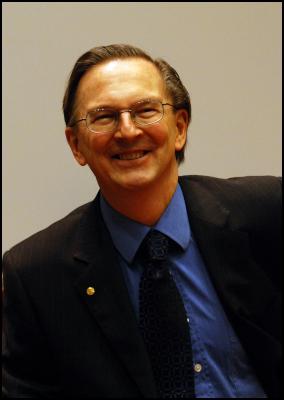Jack Szostak: "Life in Lab" In 3 - 5 Years
Jack Szostak: "Life in Lab" In 3 - 5 Years
by Suzan Mazur
June 2,
2014

JACK
SZOSTAK
"You heard it here first," announced World Science Festival moderator and astrophysicist Mario Livio as Harvard biologist and Nobel laureate Jack Szostak told a "Search for Life" gathering of 50 on Saturday afternoon in New York that he expected to make "life in the lab" in three to five years. And more likely within three years.
Livio dubbed Szostak "The Leader of Origin of Life Studies in the Universe".
Szostak, however, did not go into detail as to why he thought he was so close to a synthetic cell that self reproduces and cautioned that at the moment there are still lots of gaps in our understanding about a continuous pathway from chemistry to life.
Said Szostak on the origin of life, "for the parts that we do understand, sometimes we can see that there are two or three or four different ways this could have happened maybe in slightly different environments."
Szostak described early Earth conditions as still poorly understood:
"In particular, we know that biology uses iron sulfur compounds a lot to catalyze reactions. So why is that? Is it because that's something that was important in the beginning of life or is it because that's just really good chemistry that life grabbed hold of later on and used for its own advantage?"
He raised the question about where the materials that make the building blocks of biology came from.
"It probably can't all have come from the same environment. . . . It might be that some molecules like what we make our membranes out of might have come from deep hydrothermal vents. Other molecules might have come from atmospheric chemistry. Other molecules might have had to come from chemistry catalyzed by mineral particles. . . . Those are some of the things we just don't know that need more explanation."
Harvard astronomer and Origins of Life Initiative director Dimitar Sasselov, also a panelist, told the audience that years ago origins of life was a neglected question mostly because people thought it was too hard. But outside the meeting room he confirmed they were indeed now "very close" to life in the lab. Sasselov thinks it will take five years not three.
This is fascinating considering protocell development is roughly only a decade old.
Sasselov and Szostak are both central to the Harvard Origins Initiative as well as directors of the Simons Foundation Origins of Life Collaboration -- with Gerald Joyce (Scripps), John Sutherland (Cambridge), Matthew Powner (University College London) et al. among the investigators and with a team of postdoc researchers. Simons Foundation was one of the principal sponsors of this year's WSF.
In one lighthearted panel exchange Mario Livio further described Jack Szostak as "a very competent person," adding, "if Jack manages to do life in his lab. . ."
Szostak jested, "then you know it's really easy."
 Suzan Mazur
is the author of The Altenberg 16: An Exposé of the
Evolution Industry. Her reports have appeared
in the Financial Times, The Economist, Forbes, Newsday,
Philadelphia Inquirer, Archaeology, Connoisseur, Omni and
others, as well as on PBS, CBC and MBC. She has been a guest
on McLaughlin, Charlie Rose and various Fox Television News
programs. Email: sznmzr@aol.com
Suzan Mazur
is the author of The Altenberg 16: An Exposé of the
Evolution Industry. Her reports have appeared
in the Financial Times, The Economist, Forbes, Newsday,
Philadelphia Inquirer, Archaeology, Connoisseur, Omni and
others, as well as on PBS, CBC and MBC. She has been a guest
on McLaughlin, Charlie Rose and various Fox Television News
programs. Email: sznmzr@aol.com


 Binoy Kampmark: The Killing Of Israeli Embassy Staffers - Netanyahu’s Antisemitism Canard
Binoy Kampmark: The Killing Of Israeli Embassy Staffers - Netanyahu’s Antisemitism Canard Keith Rankin: Zero-Sum Fiscal Narratives
Keith Rankin: Zero-Sum Fiscal Narratives Eugene Doyle: Chinese Jet Shoots Down France’s Best Fighter; NZ And Australia Should Pay Attention
Eugene Doyle: Chinese Jet Shoots Down France’s Best Fighter; NZ And Australia Should Pay Attention Ian Powell: “I Can Confirm They Are Hypotheticals Drawn Largely From Anecdotes And Issues The Minister Has Heard About.”
Ian Powell: “I Can Confirm They Are Hypotheticals Drawn Largely From Anecdotes And Issues The Minister Has Heard About.” Gordon Campbell: On NZ’s Silence Over Gaza, And Creeping Health Privatisation
Gordon Campbell: On NZ’s Silence Over Gaza, And Creeping Health Privatisation Richard S. Ehrlich: Pakistan & China Down 6 Indian Warplanes
Richard S. Ehrlich: Pakistan & China Down 6 Indian Warplanes